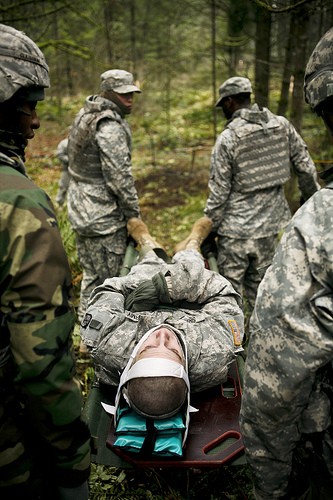Virtual Reality Treats PTSD By Helping Veterans Face Their Fears

Many soldiers deployed to Iraq and Afghanistan come home mentally crippled by the horrors of war. Many veterans often bring back a false combative outlook home to their families and everyday lives. Previous studies revealed that many military veterans often suffer posttraumatic stress disorder as well as anxiety, depression and psychological and emotional impairment. Psychologists said this is worrying because these mental disorders endured military veterans can dramatically impair quality of life.
However, researchers have discovered a type of virtual reality treatment called Graded Exposure Therapy, which they believe can improve posttraumatic stress disorder symptoms. Researchers believe that this type of virtual reality treatment can also help treat disorders associated with posttraumatic stress disorder.
Researchers believe that this type of virtual reality Graded Exposure Therapy can help treat sufferers of posttraumatic stress disorder by making them face their fears rather than avoid them. Researchers explain that the therapy exposes patients to stress-inducing events in a controlled, virtual reality environment. The treatment makes it possible for therapists to track patients' physiologic responses and to provide training and methods for patients to develop coping skills.
"Our results indicate improvement of PTSD with VR-GET based on three different measures: neuropsychological, self-report, and clinician-administered scales," lead researcher Brenda K. Wiederhold, PhD, MBA, BCB, BCN and colleagues from the Interactive Media Institute, Naval Center for Combat & Operational Stress Control, and Virtual Reality Medical Center, San Diego, and the U.S. Navy Bureau of Medicine and Surgery National Centers for PTSD, Honolulu, HI, said in a news release.
"Previously published studies have shown that VR graded exposure therapy (VR-GET) treatment can result in improvements in PTSD symptoms," researchers wrote in the study. However, not much is known about how the therapy affects depression, general anxiety and neuropsychological functioning in patients with PTSD.
In the latest study, researchers looked at changes in self-reports of PTSD, depression, and anxiety before and after the treatment. The study also assessed neuropsychological functioning by having participants complete computerized tests of simple reaction time, procedural reaction time, and performance on the congruent, incongruent, emotional, and neutral Stroop tests
"Results showed that subjects treated with VR-GET showed significant reductions in PTSD and anxiety severity and significant improvements on the emotional Stroop test," researchers wrote in the study.
However, the treatment did not result in any significant changes in depression and other measures of neuropsychological function.
"Overall, these findings support the use of VR-GET as a treatment for PTSD but indicate that benefits may be narrowly focused. Additional treatments may be needed after or alongside VR-GET for service members with neuropsychological impairments," researchers concluded.
The findings are published in the journal Cyberpsychology, Behavior, and Social Networking.
Mar 25, 2014 01:49 PM EDT





